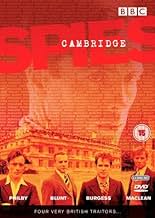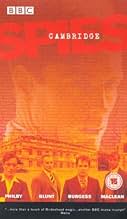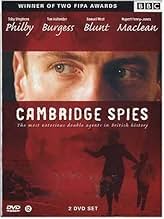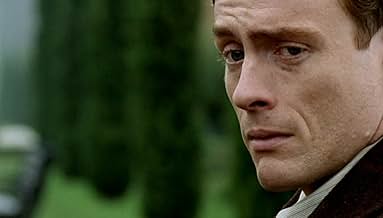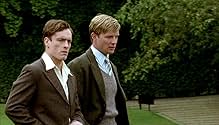Cambridge Spies
- टीवी मिनी सीरीज़
- 2003
- 59 मि
IMDb रेटिंग
7.4/10
2.4 हज़ार
आपकी रेटिंग
अपनी भाषा में प्लॉट जोड़ेंThe true story of a group of Cambridge University Students who are recruited to spy for the Soviet Union in the early 1930s.The true story of a group of Cambridge University Students who are recruited to spy for the Soviet Union in the early 1930s.The true story of a group of Cambridge University Students who are recruited to spy for the Soviet Union in the early 1930s.
- 4 BAFTA अवार्ड के लिए नामांकित
- 3 जीत और कुल 5 नामांकन
एपिसोड ब्राउज़ करें
फ़ीचर्ड समीक्षाएं
High production values and a great story drive this excellent show along at just the right pace. Never rushed or drawn-out. A few oddities with the script - some things don't seem to flow right but minor. Perhaps the editor put a few bits of film in the wrong place! David Higgs' photography is a joy to watch - it would almost be worth watching without any sound! Aspiring DPs (directors of photography)should look at his lighting, framing and camera movement. Lovely use of long lenses to separate the characters from the background. Older DPs should start to worry!
10mattsday
The BBC has once again shown that they can still create top quality drama. While there may be some historical issues with the script, one has to admire the fact that the characters are portrayed accurately and convincingly. Having just seen the last of the four-part series, I can comment that for entertainment value it is top notch.
Sure, some may argue the historical facts are inaccurate, or that the light spun upon the situation is somewhat different to how it was at the time, but much information about the infamous Cambridge spies is uncertain at best - in particular Kim Philby (Toby Stephens) is somewhat a mystery even today. Do not be fooled into thinking that this series is a documentary, it isn't. However, you will be forgiven for thinking that you are watching the actual events, with the locations, pieces and acting all first class.
Watch it with an open mind, as if it is fictional. You will be greatly rewarded, excited and even humoured at how four masterminds underplayed the archaic MI6 for their principals. I'd certainly recommend it.
Overall: 9/10 - Losing the ultimate 1 mark for seeming rushed in parts and sometimes making it hard to understand the relationships between the very complex characters - particularly at the start of the series.
Sure, some may argue the historical facts are inaccurate, or that the light spun upon the situation is somewhat different to how it was at the time, but much information about the infamous Cambridge spies is uncertain at best - in particular Kim Philby (Toby Stephens) is somewhat a mystery even today. Do not be fooled into thinking that this series is a documentary, it isn't. However, you will be forgiven for thinking that you are watching the actual events, with the locations, pieces and acting all first class.
Watch it with an open mind, as if it is fictional. You will be greatly rewarded, excited and even humoured at how four masterminds underplayed the archaic MI6 for their principals. I'd certainly recommend it.
Overall: 9/10 - Losing the ultimate 1 mark for seeming rushed in parts and sometimes making it hard to understand the relationships between the very complex characters - particularly at the start of the series.
Cambridge Spies is glamorous, intelligent and exciting - a winning formula! The acting is brilliant and the editing very stylish. The plot is slightly hard to catch at times, but it doesn't matter as the locations are stunning and performances touching. Great TV!
This is a lightly fictionalised account of how four tewwibly well brought up English boys betrayed their country to the Soviet Union. Philby's father had been a distinguished diplomat and Arabist and McLean's a cabinet minister. All had public school educations and had been undergraduates at the same Cambridge college. They set off into promising careers in the foreign office and security services and were Soviet agents from the start. Their great coup was to give the Soviets enough details about the atomic bomb to speed up their program to build one by a couple of years, but it was at the expense of blowing McLean and Burgess's cover (they escaped to Moscow in 1951), and Philby being fired from MI6. He joined them in Moscow in 1963. Blunt, by now the Keeper of the Queen's Pictures was then interrogated; he confessed, and was let go.
It's one of the really great spy stories of the 20th century. This version concentrates on the personal dynamics. The amount of contact the spies had with each other after Cambridge seems to be much exaggerated (pretty bad security), but gives us the picture of the gang of four against the Establishment. The women are interesting too. Philby was a ladies' man to whom Donald McLean's American wife Melinda (Anne-Louise Plowman) was attracted. They later lived together in Moscow. Blunt and Burgess were both gay, but friends rather than lovers.
The Establishment, in the person of Lord Halifax (James Fox), Ambassador to Washington, found it difficult to believe that 'people like us' could do such things and started looking for the atomic spy in the embassy kitchens. One or two western counter-intelligence operatives including the CIA's formidable James Jesus Angleton nearly nabbed them, but with Philby tipping them off (and duchessing Angleton), Burgess and McLean made it safely to Moscow.
With four hours to play with all the characters are richly drawn. Tom Hollander's Guy Burgess is a drunken dirty little sod who somehow manages to be witty and charming as well. It was great cover for a spy. As Donald McLean, Rupert Penry-Jones is the Golden Boy who feels himself unworthy, and sees communism as the way to redemption. Toby Stephens as Kim Philby gives us the cleverness, the deviousness and the angst as well, especially in the Spanish episode.(I'm afraid us Philbys are a devious lot, but we bleed, we bleed). Samuel West's Blunt has the occasional hint of emotion, but basically is a cold fish. Art, it seems is his life. He does get on tewwibly well with the Queen.
Seventy years on, it's not so much why they did it, but why they kept it up that mystifies. Given their location close to the heart of British Intelligence and hence knowing as much as anybody outside about what really went on the Soviet Union, it's extraordinary that Philby and McLean in particular continued on right up to 1951 (Blunt was more or less inactive after 1945). It is suggested here that Ms McLean did try to get her husband to give up spying but there's no real explanation as to why he persisted. Perhaps he still believed. Anyway, truth or fiction is hardly the point here - Sunday night is not for history lessons. This is a familiar tale well told, visually splendid and not too taxing. The real story, I suspect, is far too complex for even the most adroit (or left) TV producer. An earlier TV account,"Philby Burgess and McLean" (1977) is also worth watching, if you can find it.
It's one of the really great spy stories of the 20th century. This version concentrates on the personal dynamics. The amount of contact the spies had with each other after Cambridge seems to be much exaggerated (pretty bad security), but gives us the picture of the gang of four against the Establishment. The women are interesting too. Philby was a ladies' man to whom Donald McLean's American wife Melinda (Anne-Louise Plowman) was attracted. They later lived together in Moscow. Blunt and Burgess were both gay, but friends rather than lovers.
The Establishment, in the person of Lord Halifax (James Fox), Ambassador to Washington, found it difficult to believe that 'people like us' could do such things and started looking for the atomic spy in the embassy kitchens. One or two western counter-intelligence operatives including the CIA's formidable James Jesus Angleton nearly nabbed them, but with Philby tipping them off (and duchessing Angleton), Burgess and McLean made it safely to Moscow.
With four hours to play with all the characters are richly drawn. Tom Hollander's Guy Burgess is a drunken dirty little sod who somehow manages to be witty and charming as well. It was great cover for a spy. As Donald McLean, Rupert Penry-Jones is the Golden Boy who feels himself unworthy, and sees communism as the way to redemption. Toby Stephens as Kim Philby gives us the cleverness, the deviousness and the angst as well, especially in the Spanish episode.(I'm afraid us Philbys are a devious lot, but we bleed, we bleed). Samuel West's Blunt has the occasional hint of emotion, but basically is a cold fish. Art, it seems is his life. He does get on tewwibly well with the Queen.
Seventy years on, it's not so much why they did it, but why they kept it up that mystifies. Given their location close to the heart of British Intelligence and hence knowing as much as anybody outside about what really went on the Soviet Union, it's extraordinary that Philby and McLean in particular continued on right up to 1951 (Blunt was more or less inactive after 1945). It is suggested here that Ms McLean did try to get her husband to give up spying but there's no real explanation as to why he persisted. Perhaps he still believed. Anyway, truth or fiction is hardly the point here - Sunday night is not for history lessons. This is a familiar tale well told, visually splendid and not too taxing. The real story, I suspect, is far too complex for even the most adroit (or left) TV producer. An earlier TV account,"Philby Burgess and McLean" (1977) is also worth watching, if you can find it.
Well made and acted but I'm afraid it didn't have the guts to show the reality of the result of their treason. Why did we not see the suffering and death of the agents whom the Cambridge spies betrayed? Why did they never confront the hypocrisy of helping a regime which sides with Hitler, imprisons its' population and regularly executes their KGB contact agents? It tries to be sympathetic to men who put their loyalty to their friends above their loyalty to their country, their colleagues and those they're supposed to be protecting. What's more even that is incredibly flawed, Blunt abandons the rest of the group to their fate, Philby sleeps with McClean's wife and sends Burgess to accompany him into exile behind the Iron Curtain unaware that he's never coming back to the UK (and will quickly drink himself to death in Moscow).
What's more it only seems to tell half the story, concentrating disproportionately on the recruitment process and the influence of the Spanish civil war on the group. We get none of the fallout from the defection which was a revelation in Britain at the time or Philby's infamous press conference which is still cited today as a classic example of how to lie, we never get Philby's flight from Beruit or McClean and Caincross' plea bargain. Perhaps the most sympathetic character in the whole story is James Jesus Angleton who appears to be the lone voice in the wilderness.
So all told a great series but do some research first.
What's more it only seems to tell half the story, concentrating disproportionately on the recruitment process and the influence of the Spanish civil war on the group. We get none of the fallout from the defection which was a revelation in Britain at the time or Philby's infamous press conference which is still cited today as a classic example of how to lie, we never get Philby's flight from Beruit or McClean and Caincross' plea bargain. Perhaps the most sympathetic character in the whole story is James Jesus Angleton who appears to be the lone voice in the wilderness.
So all told a great series but do some research first.
क्या आपको पता है
- ट्रिवियाBased on the same real life events as Another Country (1984), History in Faces: Cambridge Five (2011), Philby, Burgess and Maclean (1977), A Question of Attribution (1991), An Englishman Abroad (1983), Tinker Tailor Soldier Spy (2011), Tinker Tailor Soldier Spy (1979), Blunt (1987), Traitor (1971), Blade on the Feather (1980), The Jigsaw Man (1983) and influenced the source novels of The Fourth Protocol (1987), The Innocent (1993) and others works such as A Different Loyalty (2004) and Olding (2019), even in minor form like in The Imitation Game (2014).
- गूफ़Anthony Blunt is referred to as a relative by the Prince of Wales (Edward VIII). Blunt was actually a second cousin of Elizabeth wife of George VI (later the Queen Mother) and not related to the Windsors at all.
- भाव
Guy Burgess: Vladivostok, Moscow, the Kusnetsk Basin, Cambridge - the coldest places on Earth. Of the four, Cambridge is the coldest, permanently February the nineteenth.
- कनेक्शनVersion of Philby, Burgess and Maclean (1977)
- साउंडट्रैकJerusalem
by Hubert Parry
टॉप पसंद
रेटिंग देने के लिए साइन-इन करें और वैयक्तिकृत सुझावों के लिए वॉचलिस्ट करें
विवरण
- रिलीज़ की तारीख़
- कंट्री ऑफ़ ओरिजिन
- आधिकारिक साइट
- भाषा
- इस रूप में भी जाना जाता है
- Espías de Cambridge
- फ़िल्माने की जगहें
- उत्पादन कंपनियां
- IMDbPro पर और कंपनी क्रेडिट देखें
इस पेज में योगदान दें
किसी बदलाव का सुझाव दें या अनुपलब्ध कॉन्टेंट जोड़ें


